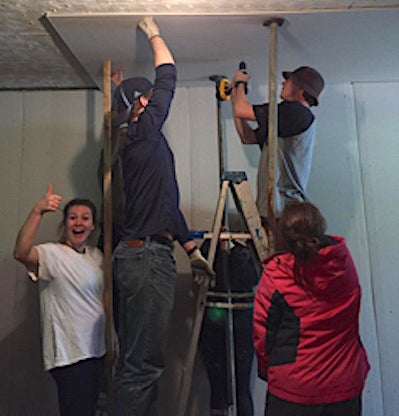KINGSTON, R.I. — April 27, 2017 — While thousands of college students kicked back at the beach or relaxed with family during spring break, several dozen University of Rhode Island students were busy repairing flood-damaged homes, working in community gardens or cleaning up trash in a blighted neighborhood.
They took part in community service projects in Rhode Island and around the country through the Feinstein Civic Engagement Program’s Alternative Spring Break initiative. The student-led, student-funded projects have drawn hundreds of students from virtually every college and major on campus since URI’s Center for Career and Experiential Education launched the program eight years ago.
This year, students from the the Academic Health Collaborative — which includes the Colleges of Health Sciences, Nursing and Pharmacy — joined students from other disciplines on trips to Georgia, Louisiana and Michigan. Students organize all aspects of each trip, from selecting two dozen participants, deciding where to go, what topic to focus on and which local organizations to partner with.
Patrick Condon, a pharmacy student from Dartmouth, Mass., traveled to Louisiana to rebuild homes damaged by floods in 2016. He said the experience teaches the true meaning of service. “It doesn’t mean ‘fix’ or ‘help.’ The people are not broken or weak,” Condon said.
Shannon McIsaac, a nursing major from Avon, Mass., found the trip deeply satisfying. “One of the most rewarding parts was being able to listen to people talk of their struggle and hardships throughout the aftermath of natural disaster,” she said. “A lot of us learned how to use saws and drills, but the most important lesson we learned was the importance of resilience and strength in a community.”
Megan Kuhnly of Granby, Conn., a psychology major and double minor in human development and family studies and nutrition sciences, traveled to Flint., Mich., where students helped build a house with Habitat for Humanity, worked in a community garden and distributed bottled water to residents, who are unable to drink city water first contaminated by lead in 2014.
Kuhnly said the experience offered lessons that you can’t get in a classroom. “Everyone deserves to be safe in their community and safe in their homes. We came back wanting to be the best person we can be and to help others,” she said.
Nicole Schwab, a pharmacy student from Buffalo, N.Y., led the Atlanta, Ga., trip. A local pastor set the tone on the first day, she said. “You are going to take the word ‘homeless’ out of your vocabulary,” he told them. The term is derogatory and describes a life situation not an individual, she explained. “A lot of the work was on how to change our mindset regarding that stigma,” Schwab said.
They did that by sharing meals with those in need, treating them with respect and hearing their stories. Some students even washed and massaged the feet of those living on the street who were open to the gesture, giving them new socks to replace ones that may not have been removed for months. The students worked with those recovering from addiction and pitched in at a food bank. “Just looking around eradicates any preconceived notions of who needs help,” Schwab said. “All people deserve to be taken care of.”
Working alongside classmates from different disciplines — an educational priority of the Collaborative — the students gained fresh perspectives, which will ripple through the URI community and beyond. “We gained so much. You can see how people connect service to their life, day to day,” Condon said. “It can be as simple as waiting a few seconds to hold the door for someone behind you.”
And they forged lasting bonds. “It’s humbling. I can’t express how proud, impressed and amazed I am by the group of individuals we brought there,” Schwab said.
Photo by Jacquelyn Potvin.

